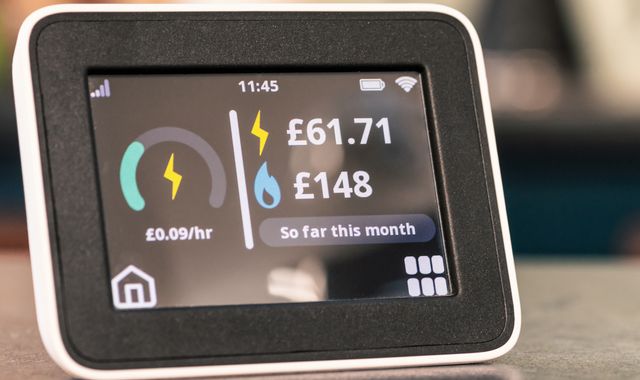The typical sum households face paying for gas and electricity when using direct debit is to rise by 2% – or £2.93 per month – to £1,755, the energy watchdog Ofgem announced.
The current price cap is £1,720 a year. A 1% increase had been widely forecast.
The latest bill settlement, covering the final quarter of the year until the next price review takes effect from January, will affect around 20 million households.
Money latest: Should I fix? Reaction to energy price cap shift
There are 14 million others, such as those on pre-payment meters, who will also see bills rise by a similar level.
Those on fixed deals, which are immune from price cap shifts until such time as the term ends, currently stands at 20 million.
Wholesale prices – volatile since Russia’s invasion of Ukraine back in February 2022 – have been the main driver of rising bills.
But they are making little contribution to the looming increase.
Ofgem explained that government measures, such as the expansion of the warm home discount announced in June, were mainly responsible.
The discount is set to add £15 to the average annual bill.
It will provide £150 in support to 2.7 million extra people this year, bringing the total number of beneficiaries to six million.
The balance is made up from money needed to upgrade the power network.
Tim Jarvis, director general of markets at Ofgem, said: “While there is still more to do, we are seeing signs of a healthier market. There are more people on fixed tariffs saving themselves money, switching is rising as options for consumers increase, and we’ve seen increases in customer satisfaction, alongside a reduction in complaints.
“While today’s change is below inflation, we know customers might not be feeling it in their pockets. There are things you can do though – consider a fixed tariff as this could save more than £200 against the new cap. Paying by direct debit or smart pay as you go could also save you money.
“In the longer term, we will continue to see fluctuations in our energy prices until we are insulated from volatile international gas markets. That’s why we continue to work with government and the sector to diversify our energy mix to reduce the reliance on markets we do not control.”
The looming price cap lift will leave bills around the same sort of level they were in October last year but it will take hold at a time when overall inflation is higher.
Food price increases, also partly blamed on government measures such as the national insurance contributions hike imposed on employers, have led the main consumer prices index to a current level of 3.8%.
It is predicted to rise to at least 4% in the coming months, further squeezing household budgets.
Ministers argue that efforts to make the UK less reliant on natural gas, through investment in renewable power sources, will help bring down bills in future.
This breaking news story is being updated and more details will be published shortly.
Please refresh the page for the fullest version.
You can receive Breaking News alerts on a smartphone or tablet via the Sky News App. You can also follow @SkyNews on X or subscribe to our YouTube channel to keep up with the latest news.






























